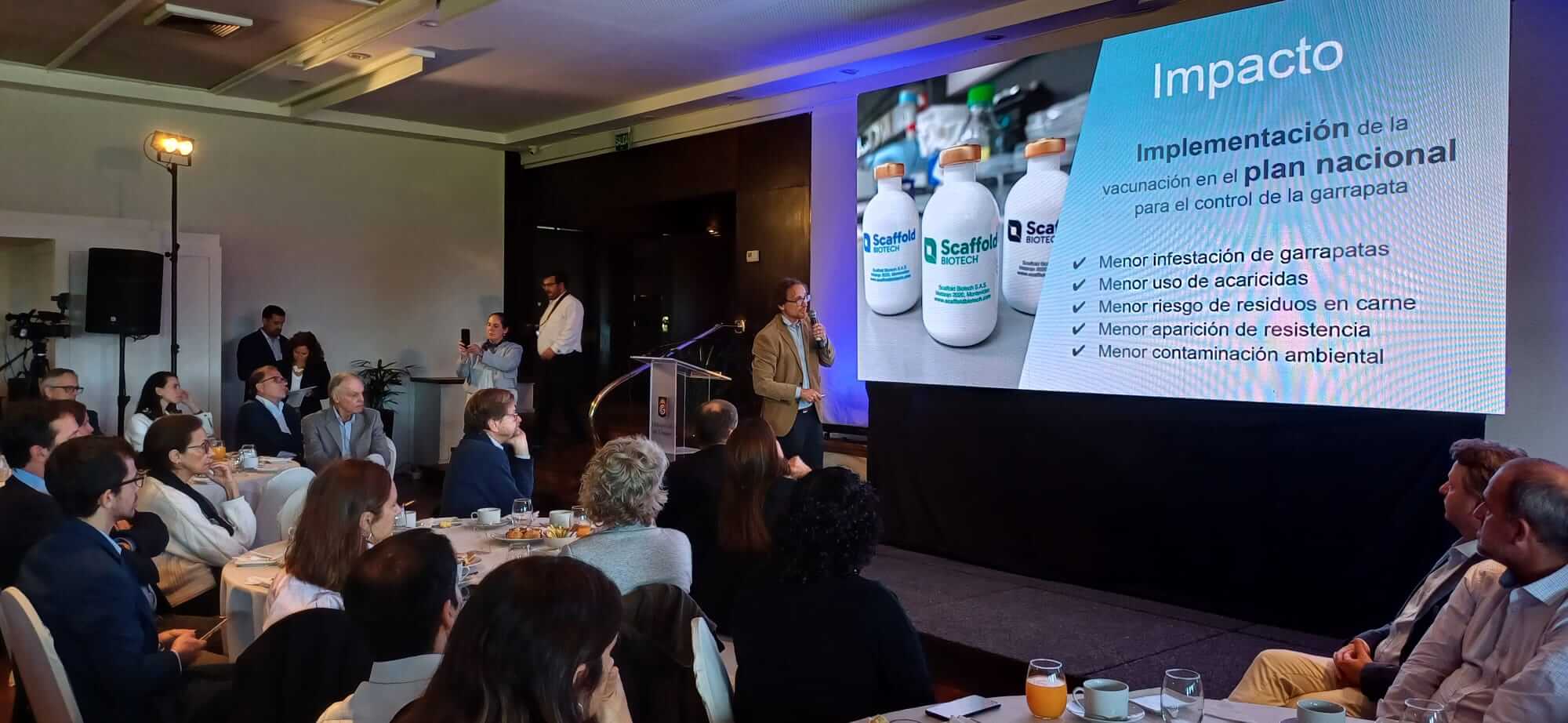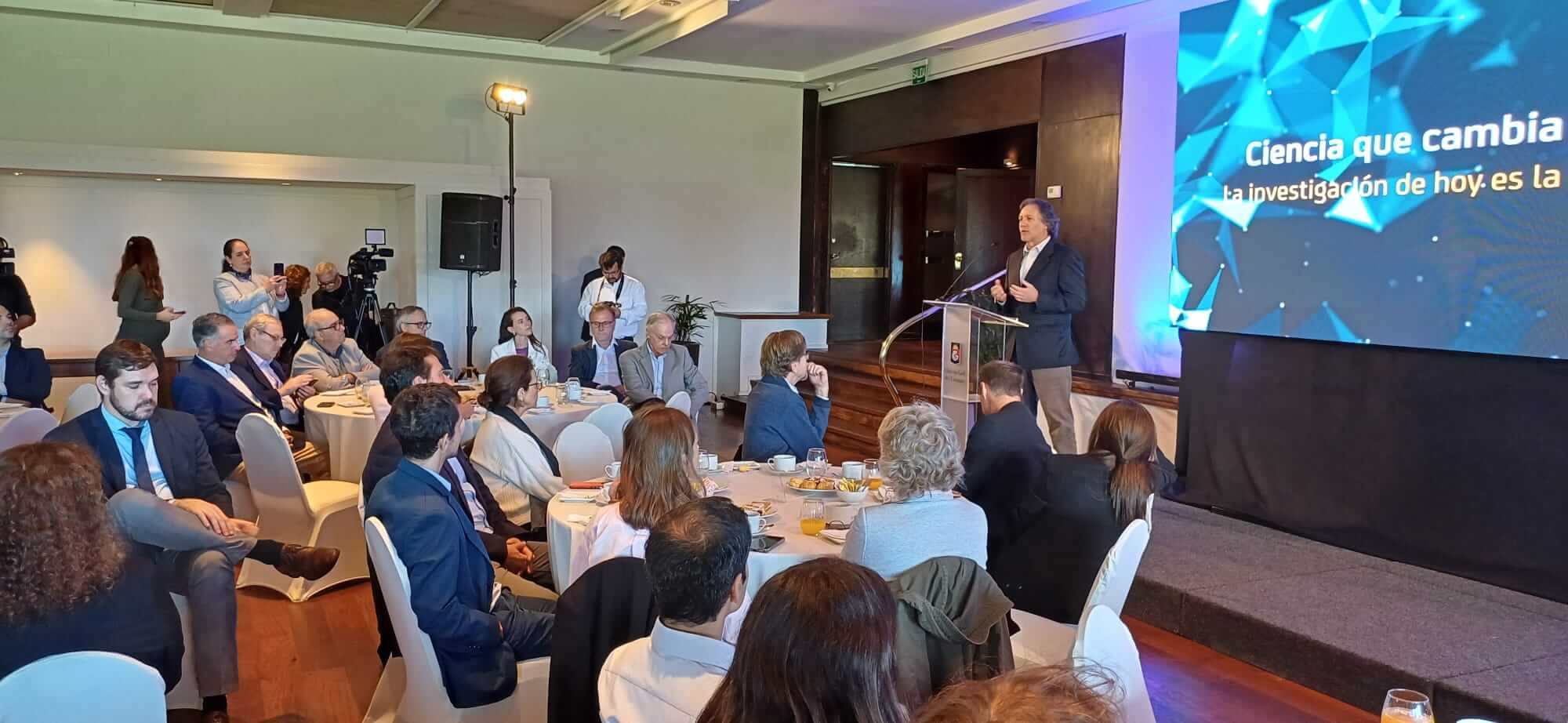The announcement was made during a breakfast event organized by the institute to bring decision-makers and government authorities closer to the scientific and innovation work it is carrying out. The promising vaccine is a development of Scaffold Biotech, a startup focused on designing and creating innovative tools, particularly in animal health. Scaffold is part of the portfolio of LAB+, the company builder launched by the institute five years ago.
The event — held on Wednesday, May 7, at the Golf Club — was attended by President Yamandú Orsi, Minister of Livestock Alfredo Fratti, and Rodrigo Arim, Director of the Office of Planning and Budget, among other national and university authorities, business leaders, investors, donors, and scientists.
The goal of the event was to share ideas and concrete solutions to further leverage the transformative power of scientific research and innovation as a driver of Uruguay’s sustainable economic and social development.
The breakfast featured four speakers who shared their perspectives on how science contributes to the country.
Carlos Batthyány, executive director of the institute, physician and PhD in biological sciences, emphasized the institute’s commitment to promoting scientific research as a tool to address issues that affect society as a whole.
Tamara Schandy, economist and founder of the financial consultancy Exante, which advises banks and companies, noted that Uruguay has grown at an average rate of 1% per year over the past decade — “less than a third of the global economic growth rate.” “Uruguay is stable, but we’re running at half speed. We need a jolt to grow faster in the coming years,” Schandy said. “To grow at rates above 2%, we need to improve productivity, strengthen the labor force, and attract more investment,” she concluded.
Agustín Correa, a researcher at the institute and co-founder of Scaffold Biotech along with Matías Machado, highlighted that ticks cause losses of over US$50 million per year in Uruguay’s agricultural sector, and he described his startup’s efforts to solve this problem. He also shared new data on the vaccine’s efficacy, field trials, and next steps.
Bruno Gili, an expert in public policy and current advisor to the Presidency on restructuring the national science, technology, and innovation system, was clear about science’s role in development: “It’s not about reinventing the wheel, but understanding how the world works.”
To conclude, Minister Fratti applauded the vaccine’s positive results: “We Uruguayans should be proud of this.” The tick problem “is a priority,” he said, and encouraged reliance on scientific research, stating, “It’s not an expense — it’s an investment.”
Results of the New Vaccine
The vaccine — developed using genetic engineering tools — is administered to cattle to trigger an immune response against ticks. This causes cows to produce antibodies against the parasite. When a tick infests the animal and feeds on its blood, it ingests those antibodies, which lead to various effects: it may reduce the tick’s reproductive capacity (a single tick can lay between 2,000 and 4,000 eggs) or even cause the parasite’s death.
After lab trials, the startup conducted field trials under natural infestation conditions, in collaboration with researchers from the Faculty of Veterinary Medicine. The first field trial, which began in the second half of 2023 and ended in early 2024, showed an effectiveness above 76%. The formulation was then improved, and a second trial conducted this year showed 90% effectiveness.
The vaccine led to a significant reduction in both the number of ticks and their reproductive capacity.
Currently, Scaffold’s vaccine is being tested in controlled trials with participation from the MGAP, and it has been announced that it will soon be incorporated into the ministry’s national tick control plan.











